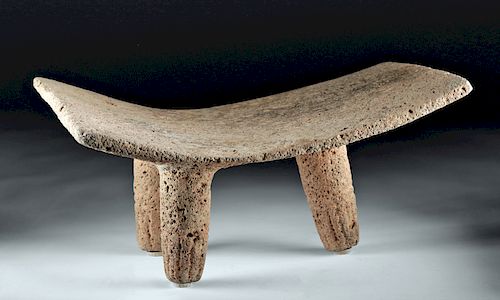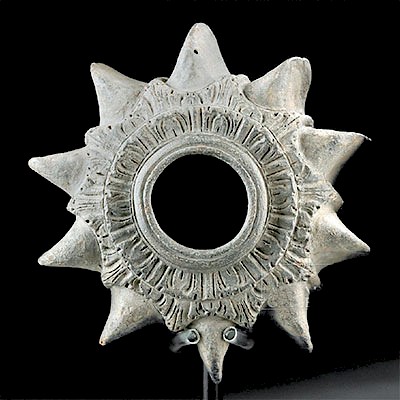Costa Rican Stone Metate - Decorated Underside & Legs
Lot 53c
About Seller
Artemis Fine Arts
686 S Taylor Ave, Ste 106
Louisville, CO 80027
United States
Selling antiquities, ancient and ethnographic art online since 1993, Artemis Gallery specializes in Classical Antiquities (Egyptian, Greek, Roman, Near Eastern), Asian, Pre-Columbian, African / Tribal / Oceanographic art. Our extensive inventory includes pottery, stone, metal, wood, glass and textil...Read more
Estimate:
$1,500 - $2,500
Absentee vs Live bid
Two ways to bid:
- Leave a max absentee bid and the platform will bid on your behalf up to your maximum bid during the live auction.
- Bid live during the auction and your bids will be submitted real-time to the auctioneer.
Bid Increments
| Price | Bid Increment |
|---|---|
| $0 | $25 |
| $300 | $50 |
| $1,000 | $100 |
| $2,000 | $250 |
| $5,000 | $500 |
| $10,000 | $1,000 |
| $20,000 | $2,500 |
| $50,000 | $5,000 |
| $100,000 | $10,000 |
| $200,000 | $20,000 |
About Auction
By Artemis Fine Arts
Jul 25, 2019
Set Reminder
2019-07-25 10:00:00
2019-07-25 10:00:00
America/New_York
Bidsquare
Bidsquare : Pre-Columbian | Tribal | Ethnographic
https://www.bidsquare.com/auctions/artemis-gallery/pre-columbian-tribal-ethnographic-4291
Featuring ancient and ethnographic art from around the world, including Pre-Columbian, Native American, African / Tribal, Ethnographic, Spanish Colonial, Fossils, Fine Art, much more. Many Oceanic pieces from an important Tucson, Arizona collection, first time at auction!! Artemis Fine Arts info@artemisfinearts.com
Featuring ancient and ethnographic art from around the world, including Pre-Columbian, Native American, African / Tribal, Ethnographic, Spanish Colonial, Fossils, Fine Art, much more. Many Oceanic pieces from an important Tucson, Arizona collection, first time at auction!! Artemis Fine Arts info@artemisfinearts.com
- Lot Description
Pre-Columbian, Central America, Costa Rica, Atlantic Watershed, ca. 800 to 1200 CE. A lovely metate, hand-carved from a single piece of grey volcanic stone. The concave grinding platform is supported by a three legs, and on the underside of the grinding platform is a beautiful angular meander border. What's more, a striated pattern surrounds the feet. Metate technology initially developed for the purpose of grinding corn; however, metates evolved into meaningful ritual objects over time, and were sometimes used as thrones for an elite lord and/or created for the lord's journey to the afterlife. Size: 18.75" L x 12.75" W x 9" H (47.6 cm x 32.4 cm x 22.9 cm)
The numerous uses of metates in ancient Mesoamerica suggest various symbolic meanings. The metate was created primarily to pulverize certain foodstuffs like seeds, certain varieties of plants, and most importantly maize. Maize has been a life source for ancient Costa Rican peoples for centuries, and its abundance during the harvest season was believed to indicate whether society as a whole would prosper or struggle in the coming months. The wealth of corn was also suggestive of not only the fertility of the land, but also those who tended to it. The rulers who used metates like this example as thrones would essentially be a physical embodiments of the assurance or dread felt within his people of the fertility and thus the survival of their land.
Provenance: ex-private Hillard collection, Boulder, Colorado, USA
All items legal to buy/sell under U.S. Statute covering cultural patrimony Code 2600, CHAPTER 14, and are guaranteed to be as described or your money back.
A Certificate of Authenticity will accompany all winning bids.
We ship worldwide and handle all shipping in-house for your convenience.
#147973One corner surrounding one leg is reattached and presents a stable radiating crack as shown. Nice red pigment or iron deposits on underside. Normal surface wear commensurate with age. Felt circles under feet to prevent scratching surfaces.Condition
- Shipping Info
-
All shipping is handled in-house for your convenience. Your invoice from Artemis Gallery will include shipping calculation instructions. If in doubt, please inquire BEFORE bidding for estimated shipping costs for individual items.
-
- Buyer's Premium



 EUR
EUR CAD
CAD AUD
AUD GBP
GBP MXN
MXN HKD
HKD CNY
CNY MYR
MYR SEK
SEK SGD
SGD CHF
CHF THB
THB
















